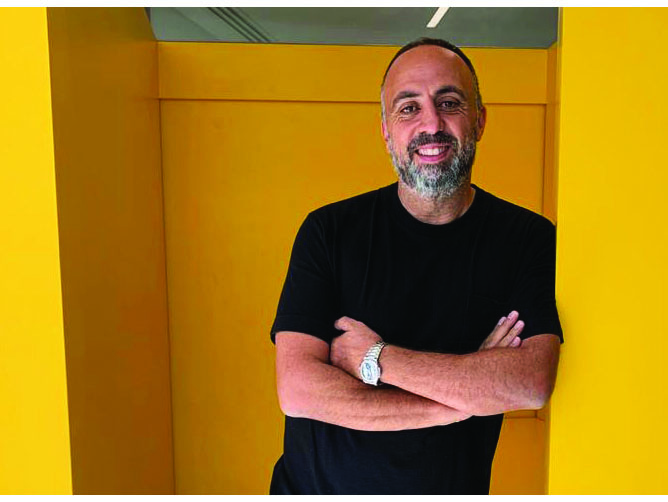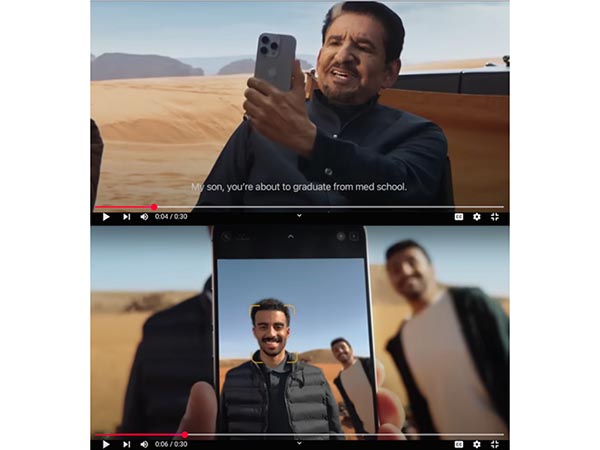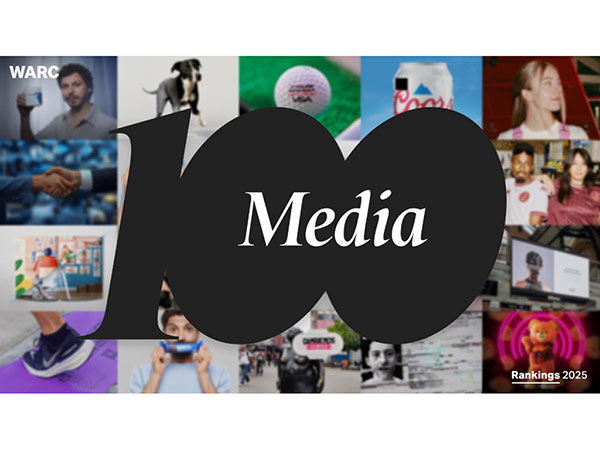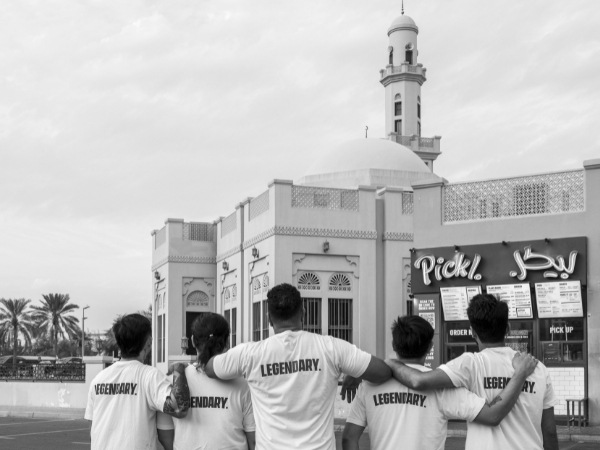News - Advertising
Reda Raad’s journey into adland
by Iain Akerman
April 14, 2022

“I was always fascinated by advertising,” says Reda Raad, the chief executive of TBWA\Raad. “My father, who was somebody I looked up to and considered a mentor, had this passion and enthusiasm for advertising that was contagious. From the very beginning I was very inquisitive and always wanted to know more. I remember we’d have these running commentaries from my father when we watched television in the evening and he would tell us the backstories of some of the commercials. This was the world I grew up in.”
Raad, who is on the other end of a Zoom call from Beirut, is happily reminiscing about the past. His early years in Dubai, the International School of Choueifat in Sharjah, his university years in New York, and his first tentative steps in advertising; most, if not all, bring a smile to his face. “You know, I was a huge sports fan growing up and excelled in all things sport from a very young age,” he says. “I pretty much played on all the sports teams, be it soccer, basketball, volleyball, and sport has always been a big part of my life. It’s taught me a lot of lessons about life and about leadership.”
Leadership, of course, is something Raad knows a thing or two about. He has made a nice little name for himself over the course of the past five years. He has led TBWA\Raad’s consolidation strategy, creating a future-looking agency with integration, data and content at its core, and has celebrated success at both the Dubai Lynx and the Cannes Lions International Festival of Creativity. He has also helped to redefine what it means to work in advertising, encouraging a culture of collaboration, a sense of belonging, and providing opportunities for individuals to shine and grow. Sure, it’s a work in progress, but the vision is there.
THE BEGINNING
Born in Lebanon in 1973, Raad is the eldest of three brothers. He grew up between Cyprus, Paris, London and Lebanon before settling in Dubai with his family in the mid-80s. His father Ramzi, now the agency’s chairman, is a much-loved pioneer of the region’s advertising industry and it was in his footsteps that Raad sought to tread. He majored in advertising and marketing management at Syracuse University in New York before returning to Dubai, where he began his career as an assistant account executive at Intermarkets. At that time his father was the agency’s executive vice president.
“I just wanted to come back and help,” explains Raad. “I remember having a conversation with my father about it and he said ‘if you come back you’re going to have to start at the very beginning’. He’s always been very big on doing things by the book, doing things properly, and that’s how it started. It started with me as an assistant account executive at Intermarkets. And that was a culture shock. I had come from America thinking I was going to change the world and I was put to work on Nissan, which is as Japanese as Japanese gets – in terms of tradition, in terms of putting in the time, building respect, and everything being meticulous. I had this almost cowboy attitude to life but I very quickly learnt that I had to adapt to the client’s culture from the beginning.
“That was a really good lesson for me. It really taught me the basics of advertising and business. At that time account executives were meant to be seen and not heard. We were the people that ordered the pizzas, wrote the contact reports, and learned the hard way. But you learn. It taught me discipline, it taught me how to focus on an industry, and it taught me to apply myself. Hard work, no shortcuts. That’s how we grew up. With that sort of mentality.”
DEFINING MOMENTS
Two defining moments stand out in Raad’s career. The first was the decision to leave Intermarkets and launch TBWA\Raad in February 2000. At the time there were just four of them – his father Ramzi, Raad himself, and two others – and the initial reaction from the industry was one of disbelief. “We were faced with a lot of resistance. People didn’t really believe it. They were like, ‘how on Earth are you guys going to succeed when all the big players are already here? What can you do differently that isn’t already being done?’ We went from being part of one of the largest agencies in the region to a complete start-up of four. Luckily for me the risk wasn’t as great as the risk my father took, because his whole career was being put on the line. But that was the beginning of everything for me.”
The second was him taking over as chief executive in 2015. Previously the agency’s chief operating officer, Raad had spent 15 years helping to build the agency. He had established TBWA\Raad’s offices in Saudi Arabia, had helped to guide the agency’s expansion strategy, and was one of the key architects of TBWA\Raad’s overall success. “That was a real ‘aha moment’. At that moment I felt the responsibility, the weight on my shoulders. I was the captain of the ship now and what I did would have a profound impact on many others.
“At that time account executives were meant to be seen and not heard. We were the people that ordered the pizzas, wrote the contact reports, and learned the hard way.”
“I was excited and I ran into the fire. I’ve always done that. I’ve been running all my life and I embrace challenges. I don’t have a problem making mistakes and learning from them. I don’t have a problem with people around me making mistakes and learning from them either. And I think it’s this ability to learn, to reinvent, fall, pick yourself up again and keep going that has gotten us to where we are today. Yes I was scared, but I was also excited. It’s not something you take lightly because you don’t want to screw it up. How do you take over from one of the industry’s pioneers? In the first year I used to ask myself ‘what would he do?’ And as I progressed in my leadership journey I started believing in myself more, believing in my capabilities, and started doing things a little bit differently.”
Interestingly, Raad is perhaps the only son of a regional advertising pioneer to have successfully succeeded his father. Many others have fallen from grace or been deemed unworthy, but he has proven his worth. He has been instrumental in transforming the agency into one of the region’s leading communications groups. “I didn’t get to where I am because I was the son of Ramzi. I got here on my own merit. And I think TBWA was very clear on that,” he says. “It wasn’t a fait accompli. I had to prove myself. Plus, it spoke volumes of the relationship that I had with my father, in the sense that we were very much complementary. And he was very wise in the way he approached it. He gave me the freedom to operate, yet he was always there in the beginning so I could ask him any questions I wanted. He didn’t just put his hands up and say ‘here it is, take it’. He was there but gave me the freedom to do what I wanted to do.”
EARLY YEARS AS CEO
It was during the early years of his tenure as CEO that a series of tough decisions were made. The agency changed its operating model to a hub and spoke approach, leading to the closure of a number of its offices around the region. Dubai became TBWA\Raad’s main hub and Beirut its creative back office, giving the agency a nimbler and more agile structure. It then set about knocking down silos, folding DAN, Tequila and Integer into the mother agency and one single P&L. It then began hiring data directors and data analysts, brought in new skill sets such as motion designers, scriptwriters and social directors, and changed its management team. Integration, data and content would be the key pillars of the agency going forward.
“We were really changing the face of the organisation,” says Raad. “Other agencies were buying social media companies and investing in building many brand portfolios under the same group. We took the point of view that we don’t need any of that. We saw the future as being integrated and therefore we had to break the silos between our companies and create one P&L. We also took a bet on younger people and had to ask some people who we’d grown up with to leave. And that wasn’t easy. They were people that were older than me, people that you looked up to, and all of a sudden you’re having these tough conversations. And when we did all of that – when we put all of this into motion – we were stepping on each other’s toes. We were all over the place.
“At that moment I felt the responsibility, the weight on my shoulders. I was the captain of the ship now and what I did would have a profound impact on many others.”
“And I realise when I look back at it now that it had to happen. We had to make these mistakes, we had to change things in order to get better. But at that time I was very scared, even if deep down inside I felt that it was the right thing to do. I trusted my gut. We had good people around so I always listened to good advice, but there was a period of two or three years when we didn’t win any big pitches and it took time for these strategies to pay off. So when it did start to pay off it felt like we were on top of the world. But that period was very tough for me personally because it involved a lot of self questioning.”
IN THE LIMELIGHT
It would take a while for the pay-off to be delivered, but when it was it catapulted TBWA\Raad into previously unknown territory. In January 2018 it was ranked among the top 10 ‘bravest and best agencies on the planet’ by Contagious magazine. In March it was crowned both agency and network of the year at the Dubai Lynx for the first time in its history. In June, it picked up six lions at the Cannes Lions International Festival of Creativity, including two golds. All of which was complemented by a succession of new business wins, including du and Careem. Although relatively successful in the past, the agency had never attained such a level of pre-eminence.
“Those were the years when I felt, ‘yep, we’ve arrived’. That was a special moment for me because as a leader you make bets, you guide the organisation in certain ways, you make certain decisions, and then only when you can look back and see your vision and what you have put into place come to life do you feel a sense of achievement and a sense of pride. And I say ‘arrived’ because I don’t think we’ve peaked in any way, shape or form. We have better years yet to come at TBWA. But that moment – that year – was all the more sweet because prior to that we had endured some of the toughest years of my career.”
NAVIGATING THE CRISIS
Now, having led the agency’s transformation, Raad is enjoying another bumper year. The advertising industry’s importance within the business ecosystem heightened during the pandemic, and TBWA\Raad built stronger and more dynamic relationships with its clients, solidified its partnerships, and drove business impact when clients needed it the most.
“To come out of the pandemic having one of our best years ever, both in terms of financial performance and creative reputation, talks volumes of the strength and the depth of this organisation. Anybody can do well when times are good. When there’s a boom everybody’s going to benefit. You’re only challenged as a leader and as an organisation when times are tough and you get to see the strength of what you have built. And for us to not only navigate the crisis but to come out of this storm with such a strong reputation and to further cement our leadership position, that’s a very proud moment for me.”
How was this possible? Two words: people and culture. It was culture and a sense of purpose that helped the agency navigate its way through this crisis and into a leadership position, says Raad, who sits on several boards and is dedicated to harnessing the power of the region’s raw talent. Raad also believes that this is one of the most exciting times to be in advertising. It’s a more complex time, for sure, but at the core of everything still lies the power of the idea. And that is something that TBWA\Raad has always prided itself on: wanting to consistently produce great work through the application of bravery, passion, ingenuity and imagination.
“To not only navigate the crisis but to come out of this storm with such a strong reputation and to further cement our leadership position, that’s a very proud moment for me.”
Interestingly, Raad also believes the pandemic has handed the organisation a golden opportunity to transform agency life, to create a better work/life balance, and to use brand disruption and creative innovation to drive client growth. The pandemic has also highlighted the changing dynamic between employer and employee, with the agency shifting from managing employee experience to managing employee life experience. The latter mirrors Raad’s own shifting personal priorities.
“At different moments in life you’re driven by different ambitions,” he says. “In the beginning you want to prove yourself. You want to get ahead, you want to be promoted, you want to work on a bigger piece of business, and you’re driven by the desire to succeed. That’s something that is human nature. You want a better life and therefore you apply yourself. But as you climb the corporate ladder your desires change. The need to prove yourself becomes less and what becomes important – for me at least – is the impact you have. Can you inspire a future generation of leaders? Can you give the people who work with you a better life? It’s a move from success to significance. How can you have a more meaningful impact on your community and how can you give back to the industry? This is what I’m focussed on now and it makes me excited about the future.”



















